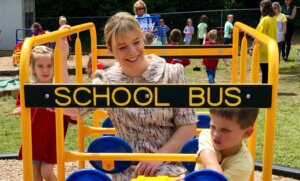By Tim LocketteClick here to read article on annistonstar.com.
MONTGOMERY — Alabama could take the first step this year toward providing free pre-kindergarten education for all the state’s four-year-olds — if legislators can find the money.
“The more I learn about pre-K, the more strongly I feel about it,” said Rep. Jay Love, R-Montgomery. “It changes lives.”
Love, who chairs the House Ways and Means Education Committee, said Tuesday he expects the budget for Alabama’s pre-kindergarten program to grow from $19 million in 2013 to $31 million in 2014.
That’s a 63 percent increase in a time when some agencies are expecting to tighten their belts. But the $12 million budget boost didn’t come out of nowhere. Late last year, a group of pre-kindergarten advocates, known as the Pre-K Task Force, called on the state to expand its free pre-K program to cover the entire state within the next decade.
Pre-K advocates have estimated that universal, voluntary pre-kindergarten would cost the state an additional $125 million per year. The Task Force proposed increases of $12.5 million per year over the next ten years.
Love, chair of the committee in charge of the education budget, said he supported that 10-year plan.
Thirty-nine states now provide some kind of state-funded formal education for children too young for kindergarten. The main reason for the spread, pre-K advocates say, is a growing body of research suggesting that children who start kindergarten without basic academic skills may never catch up in later years of school.
Alabama’s pre-K programs have earned high praise from education researchers, who cite the program’s high standards and well-educated teachers. But the state gets low marks for accessibility: Alabama’s 215 pre-K sites serve only about 6 percent of the state’s 4-year-olds.
Advocates for universal, free pre-K say educating 4-year-olds now would save the state money in the long run. Kids who need pre-K and don’t get it, supporters say, will need remediation later and may eventually drop out of school.
“Knowing what we know, it’s almost unconscionable not to provide pre-K to everyone,” said Allison de la Torre, executive director of the Alabama School Readiness Alliance, a group that campaigns for pre-K funding.
Love said he feels there’s strong support for the pre-K push in the House. He said Gov. Robert Bentley also supports the proposed increase.
Jeremy King, a spokesman for the governor, confirmed that the governor would like to expand the pre-K program,. Still King wouldn’t put a dollar figure on any proposed increase.
“Budget proposals are currently being finalized, and we will know more about potential expansion as those proposals are detailed next month,”he said.
“The governor has long been a strong supporter of pre-K,”King said.
Love said the state’s $5.4 billion Education Trust Fund budget would see its revenue grow by $100 million to $150 million in 2014, due to the improving economy. The education budget is funded largely through sales and income taxes.
Love said the increase in revenue would make the $12 million pre-K increase possible.
Still, the pre-K program would have to fight with other education programs also looking for an increase in funding. Among other things, Love noted Tuesday that in 2014, the state will likely have to pay $40 million to $50 million more toward teacher retirements than originally expected.
And no matter what current lawmakers decide, future legislators will decide whether the state follows through on a 10-year plan for universal pre-K.
“I can’t say what people will do eight years from now,” Love said.
He said expansion of the program would depend on growth in state revenue. Another recession, he said, would likely do away with any plan to expand the program.
Love said the 10-year plan was a reasonable approach to expanding pre-K. Even if the state had an extra $125 million on hand this year, he said, there wouldn’t be enough early-childhood teachers available to set up pre-K programs across the state.
De la Torre, however, said that with a $12 million increase, it would be possible to set up as many as 100 new pre-K programs in 2014. She said that dozens of private child care and preschool programs have shown an interest in converting to state pre-K programs. The change would mean more training for teachers and state-funded tuition for students in those programs.
Attempts to reach officials of the Office of School Readiness, which monitors pre-K programs, were unsuccessful Tuesday.
Lawmakers will begin debating the education budget in earnest when the legislative session begins Feb. 5.






